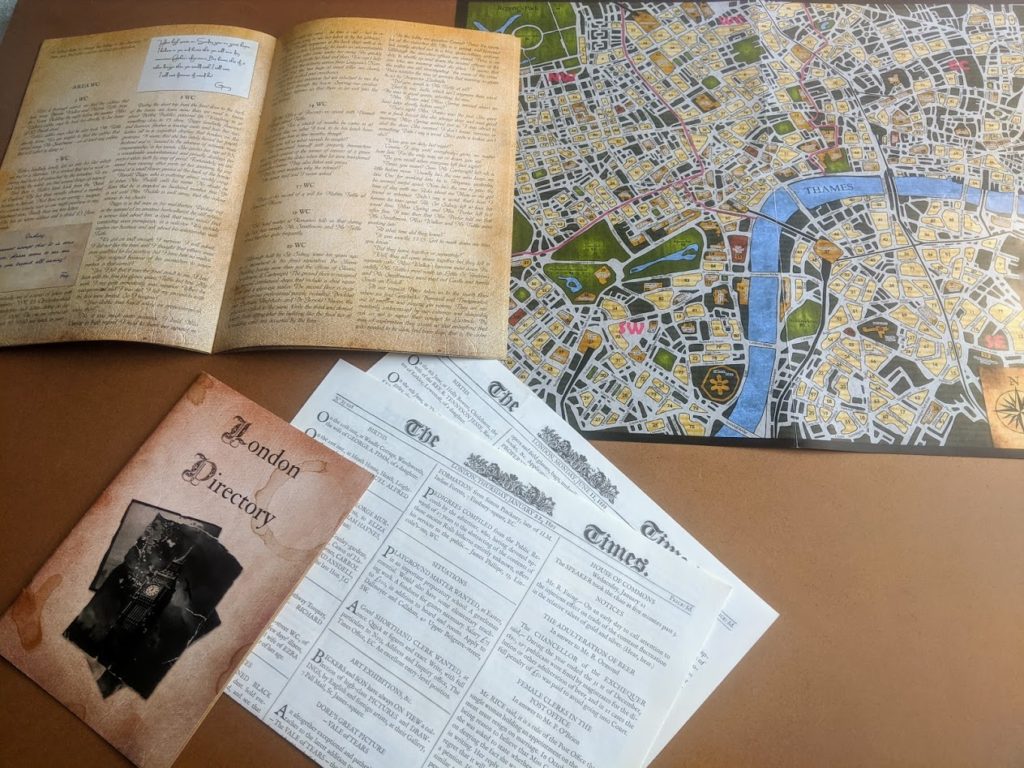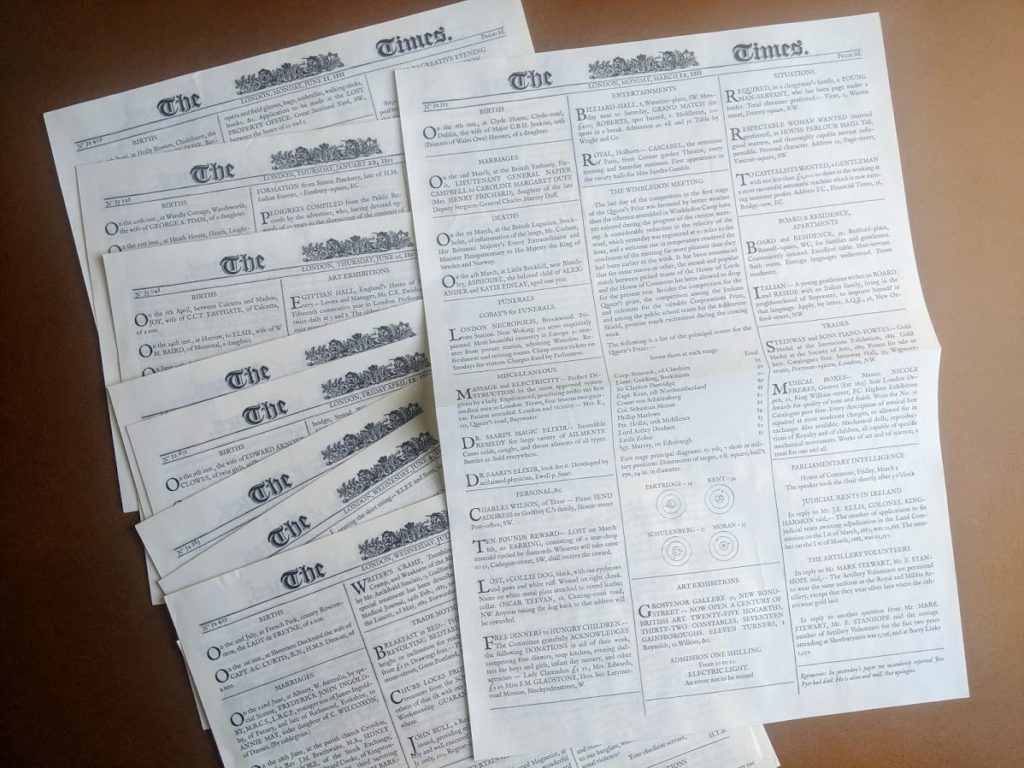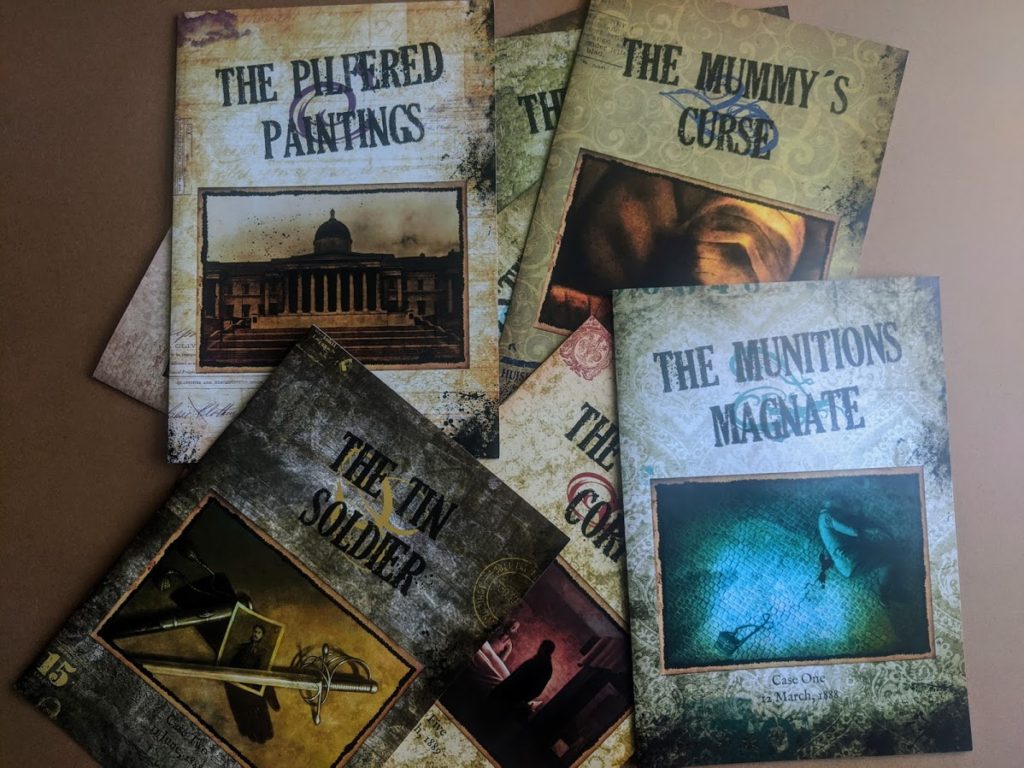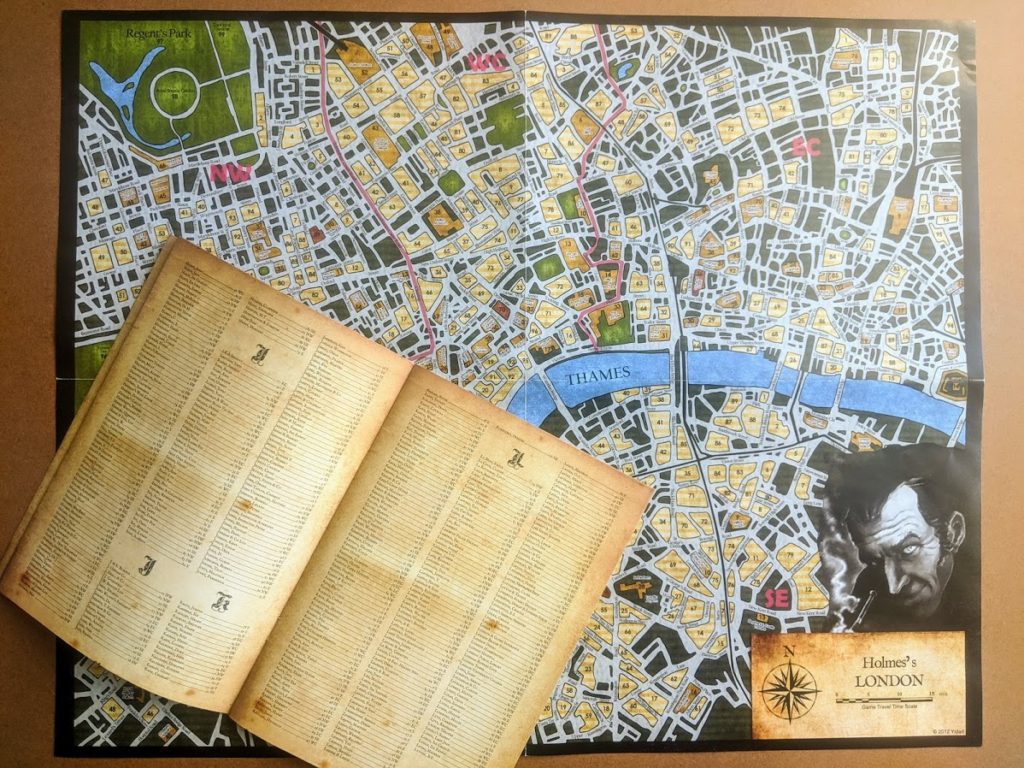“We have a receipt from the bakery, someone saw a coach in the middle of the night, and we can always talk to the widow.”
“Why would we ever go to the bakery? It’s not like he was poisoned or anything.”
“Yeah but he has a receipt. So I guess that could be a clue.”
“Imagine that we are in this situation, would we ever go to the bakery?”
“Let me put it this way. There could be a side quest there. Do you think we can resist checking it out?”
“Fair enough, bakery it is.”
Sherlock Holmes: Consulting Detective is a co-operative mystery-solving game from 1981, and… you know what? Let’s just spend some time on that last bit. This bad boy is from 1981! As of this moment, this is the oldest game we ever reviewed, and that’s not likely to change in the near future. And the game is great! Do you know how many games from the ’80s are on the boardgamegeek top 100 list? One! Heck, there are three games on that list that are from the 20th century total! (Also, there is one game from the 19th century, which must be a certified bad-ass, but out of the scope of your humble review site.)
So yeah, SHCD is old and great, but what is it?
In the box, you will find the following items: a map of London, a directory with names and addresses, ten double-sided newspapers, and ten cases – the ten “levels” of the game organised in separate booklets. You all collectively take the role of the Baker Street Irregulars. Each case starts by you reading the one or two pages of intro to the case at the beginning of the booklet, which informs you of the circumstances (someone got murdered, something got stolen, the butler recently started acting suspiciously, etc), and off you go!

There are no rounds, no time limit, your decisions are basically limited to these two actions:
- You can read a new passage from the booklet at a certain address. This action usually results in you talking to a suspect or a witness or a rando called Mr. Red Herring. These addresses are coded by the games system, for example, NW54 is the 54th highlighted house in the North-West section of the map. There are several ways to find these addresses, the most direct one is to look up names or businesses in the directory, but you can also use the map, or information from the newspaper.
- Or, if you feel confident that you know exactly what happened, you can call it a day, and turn to the last page, where you have a list of questions you must answer, and then you discuss your adventures with the titular character.
Technically, there is scoring in the game, you get points for answering correctly, and get penalties for faffing around too long, as in visiting too many locations. You compete against Sherlock Holmes who is always following the optimal routes, and quite often cheats. We are rather compulsive people, but not even we were compulsive enough to do this scoring bit, and the game works perfectly fine without it.
One more important note. As you can imagine, not many of the original prints from a publisher called Sleuth is around these days, and the few that are available go at an astonishing price. Our edition is the 2012 Ystari reprint, which might be a weird thing to emphasise, but we will come back to it.
The Good
Pff, what’s good about Sherlock Holmes: Consulting Detective, well everything! Almost everything…
The first thing I want to highlight is something that I quite rarely feel when it comes to board games: playing this game feels immensely sophisticated, it’s not as much a board game, but rather an event. You dim the lights, sit on your comfy sofa, lean back, sip some hot tea, and then one of you starts reading the new case you embark upon, “indeed”-s and “furthermore”-s and “hitherto”-s start flying around. Yes, date nights with me are wild!
And then you start taking notes, eliminate suspects, talk to the widow, look at the map for a while, try to re-create the routes, talk to the widow again in case you missed something, read newspapers to see if there is anything that ties to the case. It’s a slow, calming experience.
I also love how realistic the investigating feels. There is no huge gotcha moment. You never actually catch anyone in the act, nobody ever confesses to anything. It never happens that you dig deep enough and suddenly someone just comes out and admits to killing the victim, there is no straightforward evidence. You always really have to “solve” the case, instead of collecting arbitrary scoring clues like for example in all the Arkham games. This will make you feel incredibly smart.
The stories are mostly interesting, huge thumbs up for no “time dinosaur” levels of over-hyped stakes. It’s usually a murder or a theft. My standards might be low, but I think the text itself is mostly well written, if a bit cheesy at points. The attention to detail is mostly (mostly! we will get back to that later…) amazing, there are 10 double-sided newspapers with the important information hidden among scores of generic news, ads, editorials, etc. The world feels real and breathing. You save someone in a case, and two months later, you read in the social column that they got married.

It really feels like a game from the “good old times” when people had time for such nonsense. I easily spent hours reading literal fake news from the fake newspapers, and it felt oddly rewarding when I found a small hint of what might be going down with a case.
And finally, SHCD is also quite portable, with not too many components, and it makes a great vacation game. Although I’m being told that bringing board games with you on a vacation is not necessarily a priority to everyone.
The Bad
Quite rarely does listing the bad stuff feels as bad as now, but here we go.
There are game-breaking errors, at least in our edition. There is one case (case three in ours) that is just plain wrong. They changed the character names from the original edition when they did the reprints, but did a sloppy job, and half the clues pointed to one person while the others pointed to someone else.
The excruciating part is that it would have taken one good proof-reading to realise the problem. It is very weird to me how something like this can happen with a game where the text is the only core part. I don’t really remember board games with mistakes of this magnitude, sure, there are the occasional typos and unclear rule explanations, heck, even Gloomhaven has a typo on one of the secret messages. But the error is never like, you know, the name of the murderer in a game where the goal is to find the name of the murderer.

Now, I keep clarifying that this is in our edition, who knows if other editions have the same mistake, but I’ve played two other similar games recently from different publishers (more on that in future posts), and these types of issues seem to be a genre-wide problem. So, edition-independent advice: print an errata for any game like this, you will most likely need it.
All right, that’s the main problem, on to other smaller issues we had.
The game tells you to be fast and compete with Sherlock, but in the end there are also weird unrelated questions that you can only find the answers to if you look everywhere, and read everything in the newspaper, and follow up on every lead, even the ones unrelated to your actual case. Scoring has never been stupider in a game. Oh well, at least it’s easy to skip the scoring.
It’s also a bit weird how you don’t really have a mission – you hopefully solve the case, sure, but Sherlock already solved it in the story, and boasting about how he did it in like two steps while it took you thirty-nine, so what are we doing exactly? And why? The game never addresses it. To be fair, while playing, it felt completely natural, and we are only now considering it, in the cold light of the day.
Another aspect that might destroy someone’s immersion is the fact that you are always reading a static text. There are no timelines that can be built with this engine, you go to an address, read what’s there, and it has to be independent from whether you already talked to another specific person at another location. There are a few occasions where one address leads you to the other, so there is a natural progression there, but most of the times, the text is fixed and independent of your general progress. Compared to recent games like Chronicles of Crime it might feel a bit flat. One of us thinks so, the other one thinks that nobody will remember CoC a mere 10 years after its release, and chances are, people will still be playing SHCD, so…
The font type is atrocious, incredibly difficult to read, once again, our edition, blabla, I should stop making excuses, they really did a sloppy job producing this variant. Directory is a bit hard to navigate, and not always logical (is a business listed in the businesses section, or in the owner’s name, etc).
The Co-Op
One might ask whether this constitutes a co-op game at all. I mean, what’s the difference between playing this game and reading the book together? And yes, it is interesting, definitely a non-traditional co-op experience. You have no individual scores or actions, you basically control the same group of avatars. This is exactly the issue we had when we considered the Sherlock Holmes: Crimes and Punishments video game for our review collection.
But the rules seem to be more lax with board games, so it’s officially a co-op, and we definitely think this is a pure co-op experience, you are working together as hard as in any game. The main question here is: are you synergising as human beings? The alpha player issue would definitely be terrible here, because you all just discuss where to go next. We fortunately don’t have that problem.

And yeah, it’s great. One of you reads the sections from the booklet, the other takes good old-fashioned notes, you discuss where to go, try to remember who said what exactly, there are long brainstorming sessions, and finally someone realises what the solution is and it’s the best group effort feeling ever.
The Recommendation
Sherlock Holmes: Consulting Detective gets our absolute recommendation, despite its glaring issues. Imagine how good a game must be if we stick to it despite the major errors! It’s a somewhat tiring experience, we started playing this game in 2014 December, was at case 8 by 2016 September, and finished it on 2020 March, so it’s not a game you just literally can’t put down. But it really is a calming notion, to know that somewhere in a box you have a few cases left to solve on a quiet rainy afternoon.
There are no high highs, no low lows, it’s not exciting per se, but to us it was a deeply immersive experience.
Info
| Release Year | 1981 |
| Genre | Deduction, Storytelling |
| Difficulty | Medium |
| Number of Players | 1 to 99 |
| Length | 1.5 - 2 hours per scenario |
Rating
| Overall | Good |
| Story | Great |
| Co-Operation | Good |